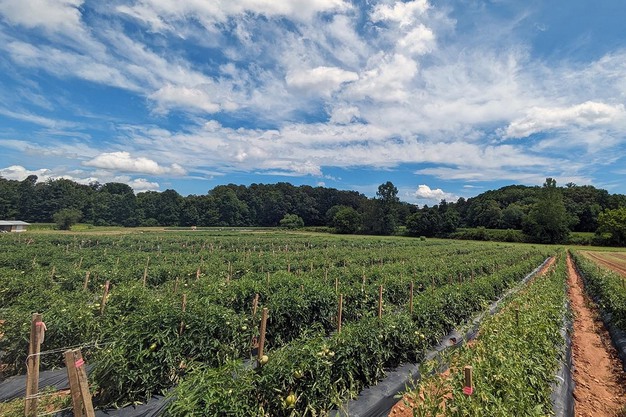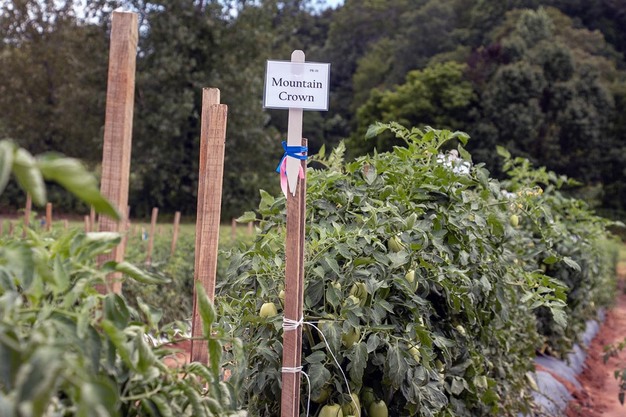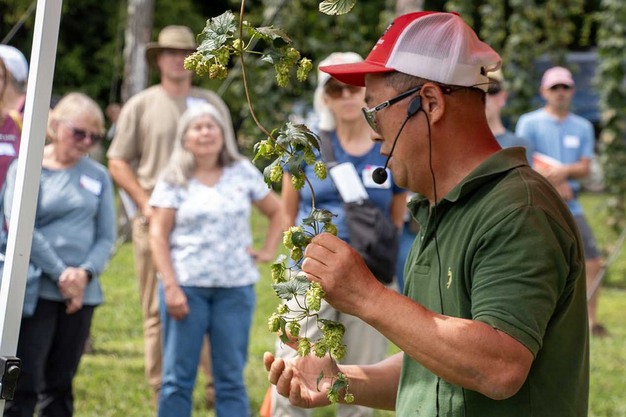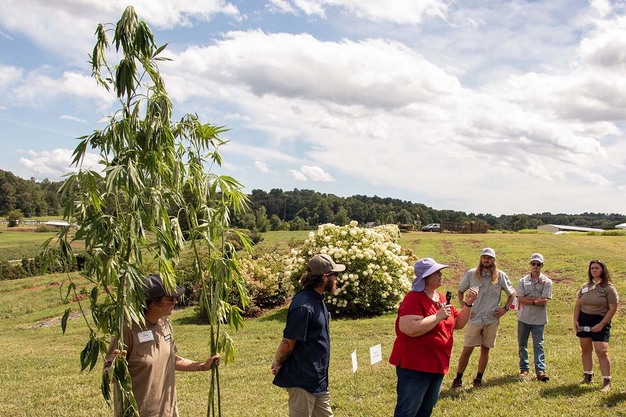Alejandro Moreno eagerly walked up and down the rows of tomatoes at NC State's Mountain Horticultural Crops Research and Extension Center (MHCREC) during a field day in August, checking out the many new varieties being grown.
Moreno's family owns a 400-acre produce farm in Rutherford County. They grow tomatoes, peppers, eggplants, grapes — "A little bit of everything," he said. The crops are sold locally at farmers' markets and shipped up and down the East Coast, from Florida to New York.
It's a competitive business. To remain attractive to buyers and to stay profitable, growers are continually searching for crops with improved yield and disease resistance, along with quality taste and appearance.

The MHCREC, located on nearly 400 acres outside Mills River, exists to help producers like Moreno. The agricultural research paradise in the lush North Carolina mountains is home to dozens of NC State Extension and research personnel who are dedicated to aiding farmers throughout the region.
The station is recognized worldwide for its tomato breeding program, which has produced superior varieties with disease resistance, larger fruit size, higher quality, and prolonged shelf life.
Field days are one way to directly connect research to growers. Producers can interact with MHCREC scientists and Extension experts and ask questions about promising new strains.
"We get to check out the new varieties and see what we can try out for next year," Moreno said. "This year I like the Mountain Crown. I want to try them out for next year. They look pretty nice."

MHCREC is one of 18 agricultural research stations across the state, operated in partnership between NC State and the North Carolina Department of Agriculture and Consumer Services (NCDA&CS). Scientists and students conduct research in real-world scenarios under natural conditions, testing varieties and methods to make farming more efficient, productive, and profitable and ultimately providing consumers with safe and affordable products.
MHCREC is located in the Southern Appalachians in the French Broad River basin at a base elevation of 2,069 feet. Its elevation, varied topography, and climate are conducive to crop research specific to the region. With innovative efforts spread across diverse terrain and within a half-day drive of half a dozen land-grant universities, the center is uniquely equipped to promote prosperity for farmers, businesses, and communities throughout the region.
"The Mountain Horticultural Crops Research and Extension Center has a long and proud history of helping farmers in western North Carolina," said Rich Bonanno, director of NC State Extension. "With dozens of Extension experts and researchers working in close collaboration, the center is well positioned to continue to drive economic prosperity for producers."
Extension specialists, agronomists, horticulture scientists, entomologists, and food safety and plant pathology experts work on a variety of commodities in laboratories, greenhouses, and field studies.
Core research areas are tomatoes, apples, and ornamental landscape crops. Additional efforts include vegetables, peaches, biofuel crops, corn, soybeans, and various specialty and alternative crops, including hops and hemp.
MHCREC is a leader in apple research. Production, disease, and insect management, and orchard management programs have helped North Carolina become No. 8 in the nation for apple production. North Carolina produces roughly 4 million bushels of apples in any given year. About 80% of them are grown in Henderson County, where the center is located.
Production of high-value specialty crops and organics is increasingly important as farmers strive to remain profitable. Through its lab, greenhouses and field trials at MHCREC, the Alternative Crops and Organics Program conducts research into hops breeding, native woodland medicinals and Chinese medicinal herbs, and floral (CBD) hemp studies.

After several years of breeding, North Carolina hops have become a viable crop with several strains producing a good yield and being used in area craft breweries, including Sierra Nevada, Wicked Weed, and Sideways Farm and Brewery.
The nursery/greenhouse industries are a major source of crop income for North Carolina farmers. MHCREC researchers are focusing on the development of new nursery crops with superior pest resistance, greater tolerance to environmental stresses, and enhanced commercial potential.
The entomology research program led by Extension specialist Jim Walgenbach focuses on solving pest management problems for the tree fruit and vegetable industries in North Carolina's Southern Appalachian and Piedmont regions.

Faculty, staff, and graduate students at the Mountain Crop Improvement (MCI) lab at MHCREC conduct applied research in plant science that results in the development of new and improved crops, technologies, and sustainable production practices.
MHCREC extends knowledge directly through workshops, field days, and tours for growers, NC State Extension Master GardenerSM volunteers, schools, professionals, businesses, and the public.
The center is ideally positioned to collaborate with researchers stationed at NC State's main campus and from other land-grant universities. It is located about 260 miles from Raleigh, and is within a four-hour drive to Clemson, Georgia, N.C. A&T, South Carolina State, Virginia Tech and the University of Tennessee.
"Some of NC State's and Extension's best and brightest people work at the Mountain Horticultural Crops Research and Extension Center," Bonanno said. "We will continue to support and grow their programs so they can continue to provide value to the people of the region and to North Carolina."
Source: ces.ncsu.edu
